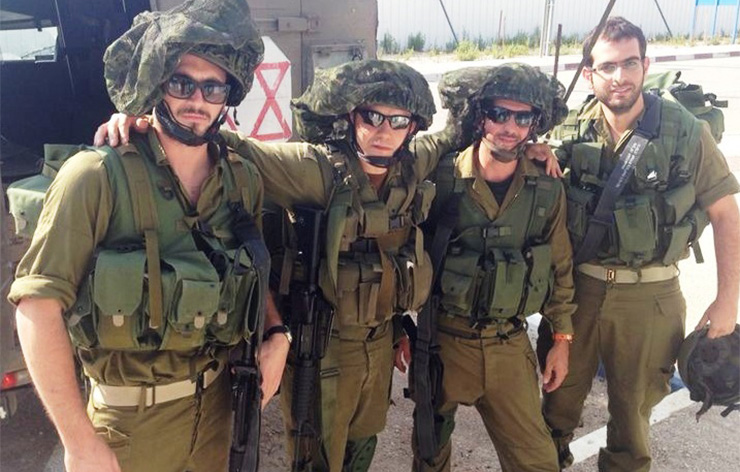The War In Gaza and Operation Protective Edge: Dr. Leor Perl's First Hand Account (Abraham & Yvonne Cohen Cardiac & Medical Exchange Fellow)

Dr. Perl in IDF
For the last 36 days I have been on active duty, serving in a reserve infantry battalion under an "extra active service" order, as part of "Operation Protective Edge" and Israel's war in Gaza against Hamas. As a third year general Cardiology Fellow at Israel’s Rabin Medical Center, and a father of two, being called into active service poses a special challenge. In fact, the draft order came while I was focused on the care of a dynamic patient in our department's catheterization laboratory, looking to spend the night on call, when the phone rang.
It is hard to explain how quickly your highly structured and planned schedule becomes irrelevant in these cases, throwing your life and the lives of your dear ones into turmoil. However, like the vast majority of the other 80,000 reserve soldiers drafted during the last month, I was proud to answer the call and wear the Israeli Defense Force’s uniform once again. In the days preceding the draft, rockets were being fired at our cities, also reaching my own area. So for the first time in over twenty years (since Operation Desert Storm in 1991), I found myself hearing sirens at home and at work, at one occasion rushing with beds of intensive care patients into a 'safe zone' within Rabin Medical Center, but also witnessing firsthand what it is like to have my own children under the missile attacks of a terrorist organization. This unbearable situation necessitated the military response by Israel, to my opinion. (For obvious reasons, I will not mention the specifics of my unit's activities, as they are still in progress.)
We were first called to the Southern front, centered at the Lachish region, opposite Gaza, later to be reassigned to the Jenin region. We are now stationed in the Jalame crossing, just outside of the city of Jenin on the West Bank. During these last few weeks I was fortunate enough to witness the best of our country's values portrayed in other reserve soldiers' actions, as they happily volunteered to take part of what they think is right, enduring harsh conditions and personal difficulties as they go.
The first day of the draft was a heartwarming experience by itself, seeing how close to one hundred percent of the manpower strength showed up, all in high spirits, ready for action as needed. On the other hand, these are sad and troubling times, obviously being close to some of the events leading to the heavy cost our country had paid, the worst of which are the lives of 64 brave soldiers and three civilians. We are also aware of the damage to our economy and the diplomatic status of Israel?all these are gravely felt these days, at the front as well. We must also remember the human toll the inhabitants of Gaza had paid, with the death of hundreds of civilians and the injury of thousands.
I can only hope that in the long term, this operation would help bring us to a safer environment, as well as a better position in the diplomatic arena. One can only dream that this would be the last round of violence in our region, and that true insight would guide the current leaders of Israel and the other relevant players in our area, so that they will be able to somehow resolve this intricate and complicated situation.
On a personal note, I am happy to return this week to the Cardiology Department at Rabin Medical Center, hoping to focus, again, on patient care, research and medical innovation. My main goal is reaching next year's Interventional Cardiology Fellowship at Stanford University Hospital and Clinics, mostly made possible by the recent Abraham & Yvonne Cohen Cardiac & Medical Research Fellowship, fully trained and ready for the challenge.
Israeli hospitals have been for decades one of the best examples of the successful coexistence present in our society, bringing together different religions and ancestries under the same roof, as one team. My nights on call are spent with nurses originally born in Russia or the Ukraine, Tel Aviv or the Israeli Arab cities. We are Muslims, Jews and Christians, all focused on fighting heart disease and the challenges of the complex cardiac intensive care unit patients, also from different minorities and origins. During this recent conflict, however, due to advancements in the accessibility of the media and the influence of the social networks, I was troublingly made aware of the differences in our points of view, sometimes to an extreme extent. I can only hope that upon my return we will once again remember that we are all in this together, aiming to deliver medical care at an excellent level, as we've done so far. The cultural and religious differences play to our advantage, in the diversity and colorfulness of our lives.
Dr. Leor Perl
The Cardiology Department
Rabin Medical Center
Related Articles
Yardeni Rabin Medical Exchange Fellow
American Friends of Rabin Medical Center in partnership with the Jewish Federation of Las Vegas is proud to present our most recent Rabin Medical Exchange Fellow, Dr. Lee Yaari.
A Doctor's Photograph is Worth a Thousand Words
It seems that Dr. Ilya Kagan, Rabin Medical Center's Nursing Quality and Patient Safety Coordinator, has commendable talents in other fields as well.
RMC's Dr. Dicker to Chair the Israel Society of Internal Medicine
Dr. Dror Dicker, Director of the Department of Medicine D and head of the Clinic for Obesity and Hypertension at Israel's Rabin Medical Center, has been appointed Chairman of the Israel Association of Internal Medicine.